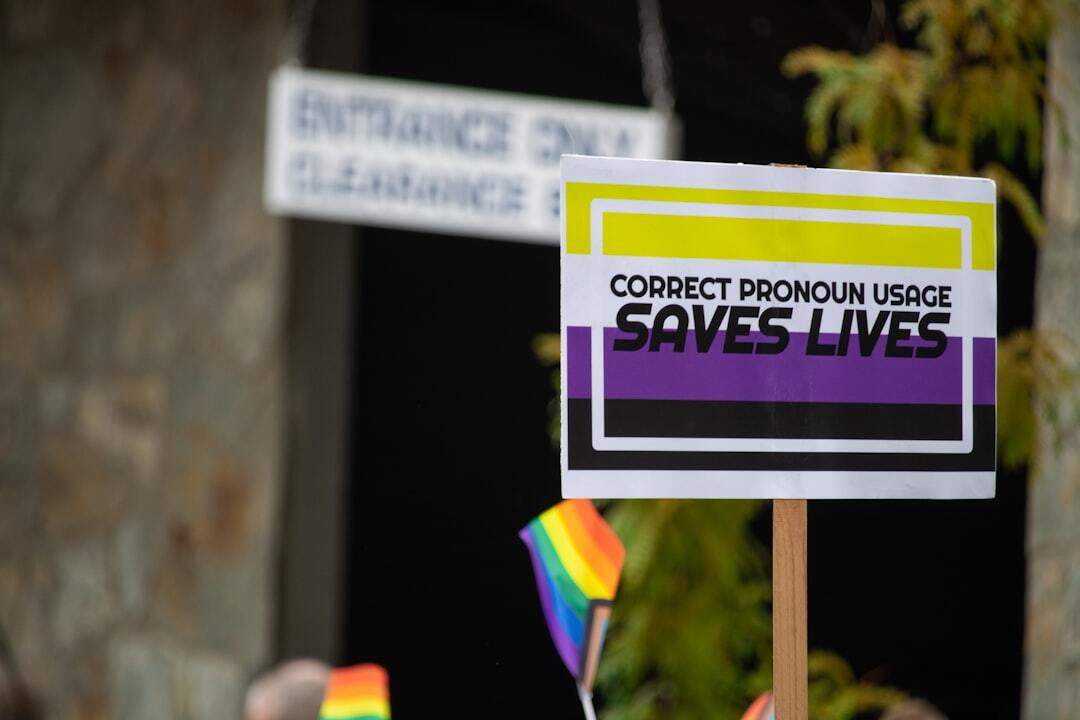The Sixth Circuit Court of Appeals (the American federal appellate court for Michigan, Ohio, Kentucky, and Tennessee) has ruled that school policies against intentional misgendering of trans students are unconstitutional. In doing so, the Sixth Circuit created a right to refer to someone using their “biological pronouns.” This, of course, begs the question: What the fuck are biological pronouns?
This particular case centers on the Olentangy Local School District in Ohio, a wealthy suburb of Columbus. Their high school handbook prohibits harassment on the basis of gender identity. In February 2023, an Olentangy parent emailed the district asking if misgendering is harassment since their child believes that gender is “decided at conception by God.” The district responded that intentional misgendering is harassment, and the parent (and the hate group Defending Education) filed a lawsuit to stop the policy.
(For the record, harassment is a big issue in Olentangy schools. In 2018, Black students reported to the school board that their White peers were using racist slurs and threatening them with deportation. The then-superintendent told the Columbus Dispatch that this racist behavior is “an ongoing fact of life throughout society.”)
The Sixth Circuit’s decision to prioritize “biological pronouns” now applies to all schools in Michigan, Ohio, Kentucky, and Tennessee. The case could be appealed the Supreme Court of the United States, but the success of such an appeal is uncertain given that SCOTUS recently allowed the federal government to misgender you on your passport.
The idea that pronouns have a biological nature is patently absurd. Pronouns don’t develop in utero and are not associated with someone’s physical or anatomical presentation. There is neither a pronoun chromosome, gene, nor hormone.
Pronouns are the product of linguistics, i.e. culturally specific human endeavors. Most English pronouns (I, you, we, they) are not inherently gendered. Many languages (including Tagalog, spoken Mandarin, and Turkish) lack gendered constructions altogether. Additionally, languages are constantly evolving with new words (including neopronouns) being added to the lexicons.
Any assertion that pronouns have a biological (and not linguistic) character is pure farce, a half-handed gesture to the pseudoscientific concept of “biological sex.” It is rooted in the false notion of binary, immutable sex and therefore the denial of intersex and trans identities.
The biological reality is that the concept we refer to as “sex” is in fact multidimensional. Sex can refer to genetics and chromosomes, hormone composition, or anatomical features (including genitalia, reproductive anatomy, and secondary traits like face/body hair and breasts).
Critically, none of these correlates of sex are themselves binary. Differences in sex chromosomes are normal, hormone levels naturally fluctuate (HRT or not), and anatomy changes appearance over the course of a life. At its core, sex is combinatorial, fluid, and non-binary.
Thus, sex (like linguistics) is socially constructed through popular understandings of what sex should be rather than what sex actually is. And in the case of intersex people, sex is literally constructed through nonconsensual surgeries. Medical malpractice by any other name, these procedures reinforce the appearance of binary sex while reminding us that immutable sex is an illusion.
Despite its emptiness, the rhetoric of biological sex asserts itself as scientific fact. It doesn’t hurt that anti-trans pseudoscience networks also manufacture evidence in support of their favored policy “solutions.” These pseudoscientists rely on the experimental logics of modern biology where knowledge is constructed by the privileged position of the experimenter who extracts information from their living subjects through manipulation and observation.
In my practice as a neurobiologist, I extract knowledge from the lab mice that I (with the help of skilled veterinarians) take care of. The data I report from my experiments ultimately belong to the mice themselves. However during the experiment, the knowledge (my data and conclusions) and the source of that knowledge (the mice) are alienated from each other. In this process, I inherently bias the knowledge that I report, and there is no way to cross-validate my conclusions with the mice themselves.
Anti-trans rhetoric around “biological sex” recasts this observer/subject dynamic: the biased point of view of the transphobic observer is privileged over the self-definition of the trans person being observed. This dynamic was first extrapolated to the realm of human sex/gender through the work of J. Marion Sims, who reported gynecological knowledge from nonconsensual surgeries on enslaved Black women (Anarcha, Betsey, Lucy, and many unnamed others).
When the experimenter/subject logic is applied to “subjects” that are human beings, it is inherently dehumanizing. To counter this, contemporary trans folx have advanced self-definition of sex/gender (including pronouns) which empowers us to do what my lab mice and most non-human subjects cannot: reject the observer outright and replace their bias with our first-person testimonies.
The Sixth Circuit’s decision in the Olentangy case and other efforts to limit social transition reassert these pseudoscientific, anti-definition logics. Schools (and increasingly, universities) have emerged as battlegrounds for a few reasons. First, minors are disenfranchised and thus politically vulnerable. Second, many parents are transphobic and feel compelled to speak for their children (often as the initial violation of self-definition). Third, schools are supposed to house “knowledge,” tapping into broader cissexism and trans denialism.
At the strategic level, the school community (especially for public schools like Olentangy) is the local community. A tailored right to misgender trans people in schools is also a broad right to misgender trans people off school property. No one becomes a different person when they pass the schoolhouse gate.
The loss of self-definition has devastating effects on young people. According to the Trevor Project’s 2024 US National Survey on the Mental Health of LGBTQ+ Young People, 90% of respondents report negative impacts on their mental health due to politics and 88% say that a top way to show support is to “trust that I know who I am.”
With this response, queer youth have already identified the basic flaw in the efforts to roll back self-definition: each of us is the ultimate gatekeeper of self-definition. This bedrock principle can never fully disappear unless we all let it disappear. At its core, self-definition relies with all of us (trans or cis) who assert our full selves in public sphere and respect each other’s humanity.
Someone who refuses to even try to respect someone’s pronouns and/or self-definition lacks basic decency toward their neighbors. To paraphrase Maya Angelou, if someone tells you who they are, believe them. In this way, we all have a role to play in maintaining (or, in some cases, reestablishing) self-definition as a pillar of polite society.
If you’re reading this, you probably have already incorporated these principles into your daily practice. But depending on the communities you inhabit, it may feel as though you are carrying this torch with few allies or, perhaps, alone. I promise that we are all walking this road together despite the vast distances between us, and our community will see us through.
Before we go our separate ways once again, I want to leave you with words of encouragement from two anonymous young people who responded to the aforementioned Trevor Project survey:
Just remember no one else can decide who you are for you, you know yourself the best and nothing and no one can change that.
Queerness is glorious & essential & deeply human.
It is poetry & starlight.
Thank you for being here!
from the archive





